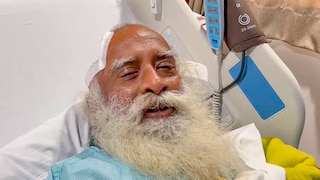Reported By: Himani Chandna
Edited By: Nitya Thirumalai
News18.com
Last Updated: March 21, 2024, 17:45 IST
New Delhi, India
Spiritual leader Sadhguru Jaggi Vasudev after an emergency brain surgery, at Indraprastha Apollo Hospital in New Delhi. (X/@SadhguruJV)
Spiritual leader Sadhguru Jaggi Vasudev has undergone brain surgery due to internal bleeding. A medical team consisting of multiple doctors at Delhi-based Apollo Hospital performed urgent brain surgery shortly after his admission to address the skull bleeding. The root cause behind the surgery was an “extremely severe headache”.
According to Sadhguru’s neurologist Dr Vinit Suri, the spiritual leader had a “very severe” headache for the last “four weeks” but had been ignoring it to go about his daily routine.
Does it sound familiar? We all keep avoiding headaches and move on to do daily stuff by popping painkillers assuming it could be due to insufficient sleep or stress. Sadhguru just faced a “life-threatening” situation because of similar assumption.
According to Harvard Health, there are more than 300 types of headaches, but only about 10% have a known cause. The others are called ‘primary headaches’, such as tension headaches which are most common, occurring in three of every four adults. Other headaches include migraine, headaches due to high blood pressure, sinus-related headaches, medication-related headaches, exercise-related headaches, among others.
Medical experts don’t completely know why most headaches happen. “They do know that the brain tissue and the skull are never responsible since they don’t have nerves that register pain. But the blood vessels in the head and neck can signal pain, as can the tissues that surround the brain and some major nerves that originate in the brain,” as per Harvard Health. The scalp, sinuses, teeth, muscles and joints of the neck can also cause pain.
People who are on certain medications or suffer from health issues should take headaches more seriously. “People on blood thinners or suffering from chronic liver or kidney issues must take headache seriously,” said Dr Sumit Ray, medical director at Holy Family Hospital, New Delhi.
“The idea is not to cause panic over headaches, but to raise awareness among people to take severe headaches seriously, especially when they are accompanied by vomiting, fever or blurry vision.”
According to Dr Sudhir Kumar, head of department, neurology, at Apollo Hospitals, Hyderabad, headaches are usually not serious, as the most common causes are migraine and tension. “These conditions usually do not result in any serious complications. Moreover, medical treatment is often effective in alleviating the headache in these conditions.”
Dr Amit Batra, associate director, neurology, Max Super Speciality Hospital, Patparganj explained the concept further, saying “90% of the headaches fall into the primary headache category where you know the headache is not due to any serious condition.” It can be migraine, it can be a tension headache, it can be a cluster headache.
“Normally, 10% of the headaches fall into the category of secondary headaches where you can have a problem in the MRI, there can be a raised pressure in the brain and there can be a host of reasons which you know merit consultation with a neurologist and should not be taken lightly,” he added.
Experts explained that a small headache is just a bother, and you can usually make it go away with a painkiller, food or coffee, or a quick break. However, if your headache is bad or different from usual, it could be an indication of serious issues like a stroke, tumour, or blood clot.
Not all causes of headaches are benign. “Some of the causes of headaches are serious and may result in disability and even death, if not recognized and treated on time,” Kumar from Apollo said.
Serious forms of headache are recognised based on their severity, abruptness of onset and the presence of neurological symptoms.
For example, Dr Rajeev Jayadevan, chairman of research cell at the Indian Medical Association, Kerala explained that if a person who doesn’t have a history of headaches experiences a “sudden severe bout”, it requires immediate evaluation.
“The presence of alarm symptoms such as vomiting, loss of consciousness or weakness in any of the limbs, predicts a stroke, which is a medical emergency. A stroke could be from a blocked blood vessel in the brain or from bleeding within the brain. A subarachnoid haemorrhage could also present with similar symptoms, the bleeding in this case being in the space outside the brain,” Jayadevan said.
Experts suggest it is important to identify the “red flags”, which could point towards a more serious cause of headaches.
First, this is the worst-ever headache you have ever had, and it’s getting in the way of your daily routine – you need to see your doctor.
Secondly, your speech is not clear, your vision is different, and you are having trouble moving your arms or legs, keeping your balance, remembering things, or staying clear-headed along with your headache – you need to be alarmed.
Thirdly, even if you have a history of headaches but they have changed in pattern or intensity, you should go and get it checked. Doctors suggest that a headache that lasts more than a few days should never be ignored.
If you notice any red flags associated with headaches, it is better to consult a neurologist and undergo a brain scan (CT or MRI) to determine the underlying cause. Early recognition and prompt initiation of appropriate treatment can be life-saving in these conditions.
